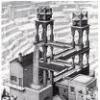Sporočila: 24
Jezik: English
Vilinilo (Prikaži profil) 20. april 2009 23:15:33

Rogir (Prikaži profil) 21. april 2009 14:38:48
henma (Prikaži profil) 21. april 2009 16:06:56
Rogir:Hmm, too little information is given to say anything sensible about this.But the conclusion is really interesting and shocking... Esperanto and English are DIFFERENT!!!! I wouldn't have expected such a discovery...


I'd like to know what they really wanted to measure... As stated in the paper, they measured word length and position and made some sort of correlation... Obviously the languages are different, word order isn't the same... The amount of words needed to say a sentence isn't even the same...
In the paper says that longer words are more difficult to pronounce and repetition is better for understanding.
Maybe the last is true (but I think sometimes saying the same idea with different words can help somebody understand when personal vocabularies differ).
The word length can increase difficulty, but longer written words aren't necessarily longer spoken words... German Scheisse is not much longer than English Nike and written it's twice as long, for instance.
And a word is difficult to pronounce not only because of length... Complex vowels and consonants, and complex syllable structure are more important... I find much easier to say "nihongo" (Japanese word for Japanese language) than "srpski" (Serbian word for Serbian language), also Swedish "Växjö" or Polish "Szczecin" are much more difficult to pronounce than "Philadelphia" (all city names).
Amike,
Daniel.
Notoj kaj kuriozaĵoj:
"srpski" is pronounced as is, no vowel sound is added... in Serbian, it's common to have "r" acting as a vowel (like in the word krv)
Szczecin is pronounced as ŝĉeĉin (did you think than esperanto sc was difficult? Try ŝĉ)

There is a more difficult city name in Polish: Szczebrzeszyn, pronounced as ŝĉebĵeŝyn...

jan aleksan (Prikaži profil) 21. april 2009 16:37:45
henma:ŝĉebĵeŝyn...ŝĉebĵeŝyn ŝĉebĵeŝyn ŝĉebĵeŝyn ŝĉebĵeŝyn ŝĉebĵeŝyn ŝĉebĵeŝyn busxdoloro
Ironchef (Prikaži profil) 24. april 2009 14:29:47
jan aleksan:England has plenty of place names that are hard for foreigners to say too, because English rarely sounds like it spells: for example there's a town in Lancashire called Oswaldtwistle which is pronounced locally as /oz'l-tŭiz'l/, and in Hertfordshire we have "Haultwick" which is pronounced /ar-tik/. At least Polish with all its "czszrzybrzeczyw" is phonetichenma:ŝĉebĵeŝyn...ŝĉebĵeŝyn ŝĉebĵeŝyn ŝĉebĵeŝyn ŝĉebĵeŝyn ŝĉebĵeŝyn ŝĉebĵeŝyn buŝdoloro

henma (Prikaži profil) 24. april 2009 15:04:53
Ironchef:... because English rarely sounds like it spells ...Yes, you're right... At least you can have a pretty good idea of how to pronounce the name. That's another factor that adds complexity to a language. In English sometimes is almost impossible to predict how a word is to be pronounced.
At least Polish with all its "czszrzybrzeczyw" is phonetic
I have found myself several times trying to say a sentence in which I have to use a word I know in English, but I haven't heard earlier (only seen it written), and I have had to change what I am going to say on the fly.
It's really annoying!
Last word I had problems with was "thoroughly" (which I still don't know how to pronounce). I don't know which sound th has for this word... where to stress it and which of the many sounds for ough to use.
Really, I'm starting to believe that conclusion... It seems that Esperanto and English ARE different.



Amike,
Daniel.
RiotNrrd (Prikaži profil) 24. april 2009 15:35:41
henma:Last word I had problems with was "thoroughly" (which I still don't know how to pronounce).If you're an American on the west coast, it's (soft th) THER-o-lee.
My guess is that the British, Australians, South Africans, etc., probably pronounce it slightly differently (and possibly differently amongst themselves as well).
jan aleksan (Prikaži profil) 24. april 2009 15:39:40
henma (Prikaži profil) 24. april 2009 15:42:31
RiotNrrd:Oh! Thanks a lot!henma:Last word I had problems with was "thoroughly" (which I still don't know how to pronounce).If you're an American on the west coast, it's (soft th) THER-o-lee.
My guess is that the British, Australians, South Africans, etc., probably pronounce it slightly differently (and possibly differently amongst themselves as well).

henma (Prikaži profil) 24. april 2009 16:04:51
jan aleksan:jeĉ ŝedĵ kĥelkĥfoje tro dĵa kĥonŝonantojnĵ ne faĉiliĝĵaŝ la prononĉonĵYes, you are right! Definitively too many consonants can cause real headaches. That may be influenced by your native language, though. For people with such languages, maybe too many vowels are a pain in the mmm also.
(You forgot to include a translation to English, remember this is the English part of the forum... (Nĵe gĥavjialji) I'd try to add a translation, but I think a native speaker could do it better, I wouldn't know how to add consonants to it while keeping it readable).
Amike,
Daniel.






